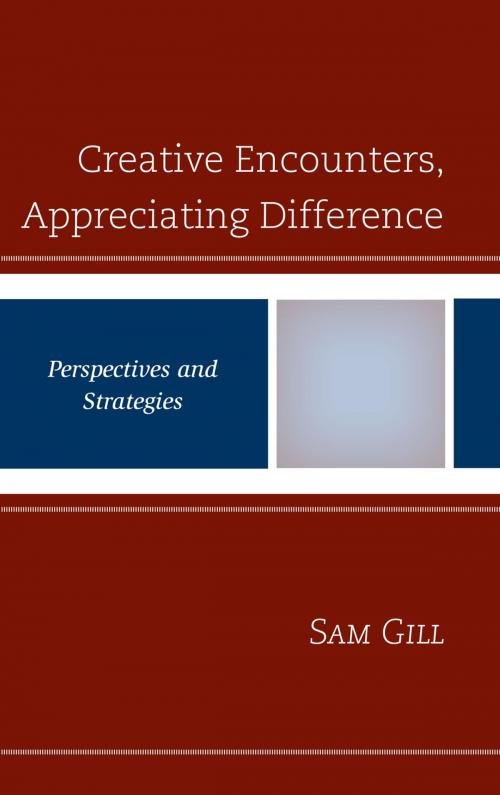Creative Encounters, Appreciating Difference
Perspectives and Strategies
Nonfiction, Religion & Spirituality, Other Practices, Ethnic & Tribal, Reference, Comparative Religion, Social & Cultural Studies, Social Science, Anthropology| Author: | Sam Gill | ISBN: | 9781498580885 |
| Publisher: | Lexington Books | Publication: | November 15, 2018 |
| Imprint: | Lexington Books | Language: | English |
| Author: | Sam Gill |
| ISBN: | 9781498580885 |
| Publisher: | Lexington Books |
| Publication: | November 15, 2018 |
| Imprint: | Lexington Books |
| Language: | English |
Across the world from personal relationships to global politics, differences—cultural, religious, racial, gender, age, ability—are at the heart of the most disruptive and disturbing concerns. While it is laudable to nurture an environment promoting the tolerance of difference, Creative Encounters, Appreciating Difference argues for the higher goal of actually appreciating difference as essential to creativity and innovation, even if often experienced as stressful and complex. Even encounters that are apparently harmful and negatively valued (arguments, conflict, war, oppression) usually heighten the potential for creativity, innovation, movement, action, and identity.
Drawing on classic encounters that have played a significant role in the founding of the academic study of religion and the social sciences, this book explores in some depth the dynamics of encounter to reveal both its problematic and creative aspects and to develop perspectives and strategies to assure encounters both include the appreciation of difference and also are recognized as creative and innovative.
The two examples most extensively considered show that the academic study of the peoples indigenous to North America and to Australia involved creative constructions (concoctions) of primary examples in order to establish and give authority to academic theories and definitions. Rather than damning these examples as “bad scholarship,” this book considers them to be encounters engendering creative constructions that are distinctive to academia, yet their potential for harm must be understood.
Most important to the book is a persistent development of perspectives and strategies for understanding and approaching encounters in order to assure the appreciation of difference is accompanied by the potential for creativity and innovation. Specific perspectives and strategies are related to naming, moving, gesture, and play and, particularly relevant to religion, the development of an aesthetic of impossibles.
Since these historical examples engage highly relevant present concerns —the distinction of real and fake, truth and lie, map and territory—the threading essays show how these more or less classic examples might contribute to appreciating these contemporary concerns that are generated in the presence of difference.
Across the world from personal relationships to global politics, differences—cultural, religious, racial, gender, age, ability—are at the heart of the most disruptive and disturbing concerns. While it is laudable to nurture an environment promoting the tolerance of difference, Creative Encounters, Appreciating Difference argues for the higher goal of actually appreciating difference as essential to creativity and innovation, even if often experienced as stressful and complex. Even encounters that are apparently harmful and negatively valued (arguments, conflict, war, oppression) usually heighten the potential for creativity, innovation, movement, action, and identity.
Drawing on classic encounters that have played a significant role in the founding of the academic study of religion and the social sciences, this book explores in some depth the dynamics of encounter to reveal both its problematic and creative aspects and to develop perspectives and strategies to assure encounters both include the appreciation of difference and also are recognized as creative and innovative.
The two examples most extensively considered show that the academic study of the peoples indigenous to North America and to Australia involved creative constructions (concoctions) of primary examples in order to establish and give authority to academic theories and definitions. Rather than damning these examples as “bad scholarship,” this book considers them to be encounters engendering creative constructions that are distinctive to academia, yet their potential for harm must be understood.
Most important to the book is a persistent development of perspectives and strategies for understanding and approaching encounters in order to assure the appreciation of difference is accompanied by the potential for creativity and innovation. Specific perspectives and strategies are related to naming, moving, gesture, and play and, particularly relevant to religion, the development of an aesthetic of impossibles.
Since these historical examples engage highly relevant present concerns —the distinction of real and fake, truth and lie, map and territory—the threading essays show how these more or less classic examples might contribute to appreciating these contemporary concerns that are generated in the presence of difference.















